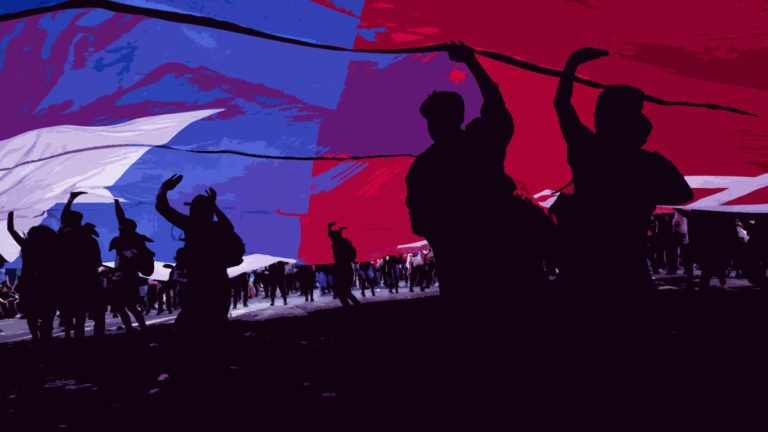The minimum required of democratic countries is that their authorities are elected by the people in free, informed and secret elections. In Chile, let’s say that this objective is fulfilled, although the elections are not so free and informed, because for this to happen, there needs to be diversity of information and money should not exert such a decisive influence on the population.
Our leaders decide everything in the name of the people, but in reality the people are not really considered when it comes to making decisions. In some countries, plebiscite consultations are frequent when it comes to adopting even traffic regulations and all kinds of projects that affect the life of neighbourhoods and towns. Here, however, only a few mayors dare to ask their neighbours about community projects, even though their opinions are not binding.
In this connection, there are countless business and commercial activities that severely affect the health of the environment as well as that of the inhabitants. Thus, there are frequent denunciations and mobilisations by citizens protesting against the condescension of their authorities towards eco-destructive ventures, when they are not even supposed to have handed out bribes to make them happen.
Electoral campaigns are supposed to emphasise the candidates’ proposals, but we have already seen that much of what is promised does not materialise in the end; that there is no consistency between electoral promises and their subsequent realisation. Our history speaks of more than a few leaders who have severely failed to fulfil their promises and have even ended up governing with their opponents, along with exercising harsh repression against those who represent such nonsense.
Being left-wing or right-wing has not been very important when it comes to governing in Chile, as in other democratic impostures, so much so that often no major differences can be seen between the two. All of which ends up benefiting those who are effectively in charge in the country and who are, whether submerged or not, among the business leaders and the powers that be.
History, in any case, ends up recognising those leaders who were willing to govern with and for the people. It values those effective transformations and condemns deserters or traitors, who often end up as statues. Only coups d’état succeed in interrupting the continuity of governments and parliaments. In our country there is no possibility of removing those who violate the will of the people. Just as there is impunity for corrupt politicians, be they legislators, mayors, ministers of state and so many others. In addition to the relatives and friends of the President and those foreign interests that manage to prostrate them in his service.
Another democratic condition is the separation of the powers of the State. However, in Chile, high magistrates and the Attorney General are appointed by the President of the Republic and the senators, in processes that measure above all the political affinity of the potential judges, as well as the fact that they do not have a record of prosecuting authorities who lack probity. Examples of this are currently on display with the embarrassment that several ministers proposed by the Supreme Court have had to suffer, in two successive lists of suitable people to carry out this task professionally.
Nor do the judiciary and other important public agencies have resources that are not subject year after year to the National Budget Law. Only the military partially escapes the allocations determined by the two highest branches of government, while what is allocated to the police is always discretionary. Not even the ferocious pandemic has managed to diminish allocations for the purchase of weapons that have a remote possibility of being used in defence of our territorial sovereignty.
Parliament is often a severe obstacle to the will of the citizenry, as its members are elected by a system disproportionate to the demographic distribution of the Chilean population. This explains why constituencies or districts with few inhabitants elect more legislators than those with a high population density. This encourages political quotas and the emergence of all kinds of electoral groupings, without ideological or programmatic consistency or sustainability over time. More than twenty party denominations have seats in the legislative branch and no less than half of them are part of the ruling party.
Thus, it is not so strange that the new constitutional itinerary will be governed by the legislators, the so-called “Committee of Experts” and the “Technical Committee on Admissibility”, creations that will put us at the mercy of the “political parties”. These creations will protect us from any idea that may prosper in the Constitutional Council that contradicts the ideological lock or the “edges” already agreed by the parliamentary benches with the consent of La Moneda. It is taken for granted that the members of the first two bodies will be people agreed upon by the political parties involved in the process.
The ” Chilean” democracy is very similar to the one that ruled among the Athenians and Romans. It is based on the agreements of the leaders who at this stage do not hesitate to call themselves a caste or political class. The difference is that now the citizens are all adults, rich and poor, and women have achieved the merit of parity with men. A positive discrimination that so far does not seem to be so inconvenient to politics as a whole.
The suffrage of the indigent and the most uninformed is limited by electoral propaganda that is usually backed by billions of dollars to control their consciousness and bring them to the polls. They are also used to exercise various forms of bribery. This is why the mainstream media are so protected and favoured by the authorities, despite the fact that it is no longer so easy to co-opt social networks.






